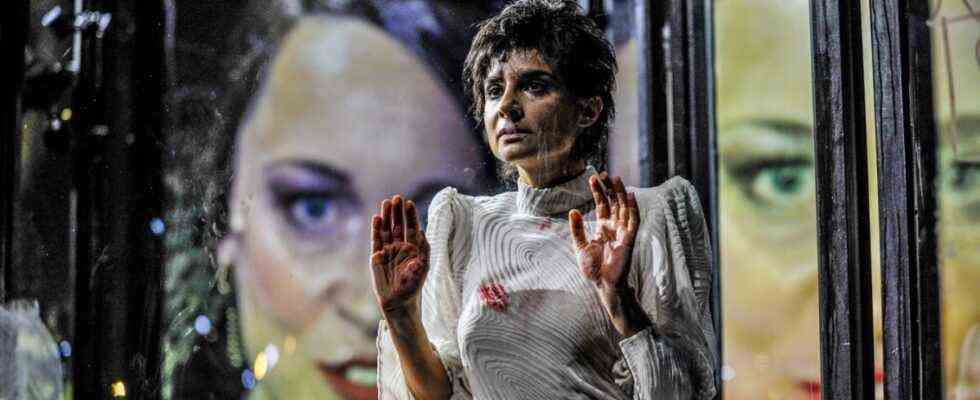This Medea is not a child murderer, nor a fratricide, nor is she the murderer of her lover’s bride. She’s a prisoner, yes, but that’s all here, in this fascinating glass box labyrinth with which Jo Schramm filled the stage in the Karlsruhe State Theater. She, Medea, knows the secrets of the cities, whether Colchis or Corinth, she knows the abysses of their rulers, who built their power on the murder of their own children. Millennia of a myth curdle in this Medea, and now Sarah Sandeh sits there, filling this Medea with raw emotionality, love and pride, the glowing furnace of a self-confident woman: “I am no longer a young woman, but still wild, that’s what the Corinthians say For them a woman is wild if she insists on her head. “
That fits. Anna Bergmann, acting director at the Staatstheater Karlsruhe, staged Medea. But not one of the ancient traditions. She adapted Christa Wolf’s novel “Medea. Voices” for the stage, created a dialogical version from the monologues that Wolf ascribed to the individual characters, added a pinch of Grillparzer and listened to the wishes of the performers. Your Medea is trapped in systems that it completely sees through, but cannot change anything about them. Anna Bergmann is different.
In her department, she would like to see people at eye level: Anna Bergmann, acting director at the Karlsruhe State Theater.
(Photo: Mike Wolff, TSP / Imago / Tagesspiegel)
Bergmann took up her position in 2019 and met artistic director Peter Spuhler in Karlsruhe. Spuhler is passionate about the theater – when he ran the Tübingen State Theater, around 20 years ago, he didn’t see his apartment in the old town for a year because he preferred to sleep on the sofa in the theater. There can be such crazy people at the theater, but Spuhler found it difficult to understand that a de facto 60-hour week might be sufficient for his close employees.
Bergmann wants to completely abolish hierarchies in the acting department
At the Karlsruhe State Theater, which Spuhler took over as general manager in 2011, his behavior intensified insofar as he, following numerous statements from employees, developed a control mania, built up extreme pressure and a “climate of fear”. In 2020 this became public; Finally, a few months ago, Spuhler’s contract was terminated due to considerable external pressure. There are voices in Karlsruhe who say that this was just the right thing for conservative opera fans, because Spuhler’s preferences for innovative directorial solutions have not appealed to them for a long time. Ulrich Peters was brought from Munster to succeed Spuhler; previously the director had been in Augsburg and at the Munich Gärtnerplatztheater.
The debate about Spuhler’s management style led to a catalog of measures to improve working conditions being drawn up at a round table at the Karlsruhe building, a steering committee formed from all departments of the house, which is to ensure implementation together with the theater management. Anna Bergmann goes even further. She wants to completely abolish hierarchies within the acting department. Together with her deputy Anna Haas, who is also the dramaturgy for “Medea. Voices”, and the drama manager Christian Schürmann, she wants to form a management team that will also include two representatives of the ensemble. Bergmann complains that the hierarchical job descriptions are still in place, and she wants to get rid of that. Ulrich Peters, who at least at the Gärtnerplatztheater had not yet been noticed by modern line solutions, had signaled readiness.
One can certainly trust Bergmann that she will develop the future of the theater in Karlsruhe
Bergmann sees her acting department as the nucleus of a counter-model that is to be based on an approach on an equal footing, that is to handle human and financial resources more carefully and to promote the freedom of artistic processes. Basically, she can be grateful to Patriarch Spuhler. He gave the impetus. Bergmann: “If he had behaved nicely and friendly, the centuries-old management structure would have been preserved.”
One can certainly trust Anna Bergmann that she will develop the future of theater in Baden. In directing she has already reversed the gender ratio, there are significantly more women directors than men. Strong women are also on stage in “Medea. Voices”. The grandiose seething Sarah Sandeh, the peculiar physical being Swana Rode as Medea’s former student, Sina Kiessling as Akama, power strategist in Corinth, a merciless Margaret Thatcher – but why should women in positions of power be kinder than men?
There is something redundant about the performance, but it has insane power and an icy temperature that makes you burn blisters. (Cartoon) films tell the prehistory, Jason (Thomas Schumacher), with Medea’s help, steals the Golden Fleece from Colchis, which is strongly reminiscent of the GDR – a reference to Christa Wolf’s biography. On the other hand, there is capitalist Corinth, in which Glauke, the king’s daughter, is to be sold to Jason for reasons of maintaining power. Full of heartache: Frida Österberg, opera singer in the drama ensemble, plays Glauke and sings arias from Cherubini’s “Medea” opera, extremely moving, surrounded by a crackling sound design (Hannes Gwisdek). She is the inverted reflection of Medea. Sacrifice one, the wild counter-model the other. But their victory is still pending.

